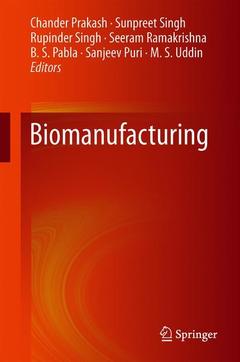Biomanufacturing, 1st ed. 2019
Coordonnateurs : Prakash Chander, Singh Sunpreet, Singh Rupinder, Ramakrishna Seeram, Pabla B. S., Puri Sanjeev, Uddin M. S.

- synthesis of biomaterials;
- implant coating techniques;
- spark plasma sintering;
- microwave processing; and
- cladding, powder metallurgy and electrospinning.
Dr. Chander Prakash is an Associate Professor at the School of Mechanical Engineering, Lovely Professional University, Jalandhar, India. He holds a Ph.D. in Mechanical Engineering from Panjab University, Chandigarh, India, and his research interests include biomaterials, rapid prototyping & 3-D printing, advanced manufacturing, modeling, simulation, and optimization. With more than 11 years of teaching experience and 6 years of research experience, he has published 50 research papers and 10 book chapters. He is also editor of 3 books and 3 journals.
Dr. Sunpreet Singh is an Assistant Professor at the School of Mechanical Engineering, Lovely Professional University, Jalandhar, India. He holds a Ph.D. in Mechanical Engineering from Guru Nanak Dev Engineering College, Ludhiana, India. His research interests include additive manufacturing, and 3D printing for the development of new biomaterials for clinical applications. He has published 50 research papers and 10 book chapters.
Prof. Rupinder Singh is a Professor at the Department of Production Engineering, Guru Nanak Dev Engineering College, Ludhiana, India. His research focuses on non-traditional machining, additive manufacturing and the development of porous biomaterials using 3D printing and rapid prototyping techniques. He has more than 18 years of teaching and research experience and has published 17 books and 3 book chapters.Prof. Seeram Ramakrishna is Co-Director, NUS Nanoscience & Nanotechnology Initiative (NUSNNI). He has received his Ph.D. from the University of Cambridge, and is a global leader in electrospinning and nanostructured materials. Professor Seeram Ramakrishna’s research has resulted in approximately 1,000 peer-reviewed articles with over 70,000 citations and an h-index of 120. He has published 5 books and 25 book chapters. He has been recognized as a Highly Cited Researcher in Materials Science.
Prof. B. S. Pabla is
Presents cutting-edge research on how to produce and apply biocompatible materials and structures using modern manufacturing systems
Combines life science and engineering perspectives
Discusses the materials science and manufacturing challenges of creating biomaterials, and the biological and clinical issues associated with their application in medicine
Date de parution : 03-2019
Ouvrage de 271 p.
15.5x23.5 cm



